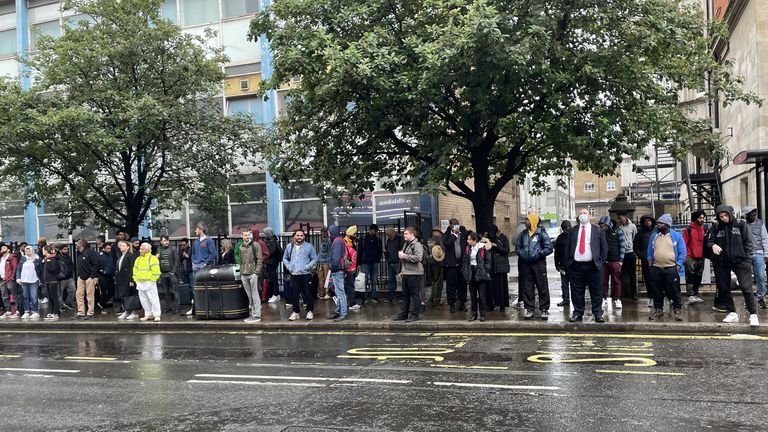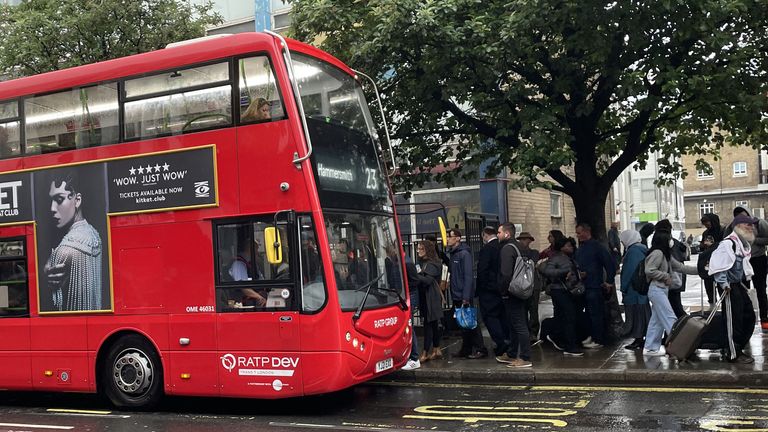Tube strike causes travel ‘chaos’ for commuters returning to work after Platinum Jubilee weekend
People returning to work following the Platinum Jubilee bank holiday weekend have faced travel “chaos” as a Tube strike caused major disruption.
London Underground has advised people not to travel, warning of a severe impact on the network from the start of service on Monday until 8am on Tuesday.
Some 4,000 members of the Rail, Maritime and Transport union (RMT) are taking part in industrial action in a dispute over jobs and pensions.
The 24-hour walkout has caused problems for passengers across the network on the first working day after Platinum Jubilee celebrations over the four-day weekend.
Transport for London (TfL) said some train services will run but many stations, especially those in central and south London, will be closed, while others may only open for limited periods.
“Buses, DLR, London Overground, Elizabeth line and Trams are not affected by the industrial action and are running normally. However, they are busier than usual,” TfL tweeted.
Downing Street condemned the “deeply disappointing” strike action on the London Underground.
“This sort of action is deeply disappointing and not what the public want to see, not what we want to see for businesses still trying to recover post-pandemic, people’s lives being disrupted in London,” the prime minister’s official spokesman said.
“Obviously industrial relations at TfL (Transport for London) are a matter for TfL and the mayor but it’s clear that under the current funding settlement TfL must take all reasonable steps to avoid industrial action.”
Construction worker Miguel Basantes was stuck at Paddington station while trying to get to work in Hampstead.
The 54-year-old said the situation was “chaos”.
He added: “In Liverpool Street there were crowds of people and I was waiting for 20 or 30 minutes.
“I don’t know how to get to work.”
Indian restaurant worker Kundan Darla, 25, said: “I think it is bad, I am too late for work.”
Meanwhile, droves of frustrated passengers gathered around the entrance to Waterloo station.
In a domino effect, the strike has caused delays on London’s roads, affecting private cars, commercial vehicles and buses.
The level of road congestion was 71% at 8am, up from 64% a fortnight earlier, according to location technology firm TomTom.
The figures represent the proportion of additional time required for journeys compared with free-flow conditions.
Transport for London (TfL) said no plans have been tabled on pensions or terms and conditions, insisting that no one will lose their jobs because of the proposals it has set out.
As part of previous funding agreements, the government has required TfL to work towards achieving financial sustainability on its operations by April 2023.
TfL has proposed not recruiting into around 500 to 600 posts as they become vacant.
The RMT said that, under current proposals, working agreements will be torn up and the looming threat to pensions remains in place.
General secretary Mick Lynch said: “We are demanding a direct face-to-face meeting with mayor Sadiq Khan to sort this mess out.
“There’s no point in our union continuing to sit opposite management representatives who have neither the inclination nor the authority to negotiate a settlement, when the power lies with the mayor.”
RMT members on the Tube are also taking action short of a strike, meaning station staff might not work overtime, until Sunday 10 July, which may result in short notice station closures.
Elsewhere, half-term holidaymakers have faced more travel disruption after the jubilee weekend with British travellers stranded abroad due to flight cancellations.
For all the latest business News Click Here



